

Stress at the workplace. Workplace Stress: 8 Signs You Are Suffering. Work-related stress is the response people may have when presented with work demands and pressures that are not matched to their knowledge, and abilities and which challenge their ability to cope March 9, 2020 4 min read Opinions expressed by Entrepreneur contributors are their own.
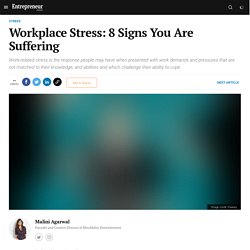
You're reading Entrepreneur India, an international franchise of Entrepreneur Media. Coping with stress at work. Everyone who has ever held a job has, at some point, felt the pressure of work-related stress.
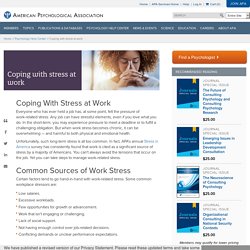
Any job can have stressful elements, even if you love what you do. In the short-term, you may experience pressure to meet a deadline or to fulfill a challenging obligation. But when work stress becomes chronic, it can be overwhelming — and harmful to both physical and emotional health. Unfortunately, such long-term stress is all too common. In fact, APA’s annual Stress in Americauudyrvysezxwwadraactcaeby survey has consistently found that work is cited as a significant source of stress by a majority of Americans. Common Sources of Work Stress Certain factors tend to go hand-in-hand with work-related stress. Low salaries.Excessive workloads.Few opportunities for growth or advancement.Work that isn't engaging or challenging.Lack of social support.Not having enough control over job-related decisions.Conflicting demands or unclear performance expectations.
9 Ways to Handle Job-Related Stress From Dawn to Dusk. It's all in a day's work.
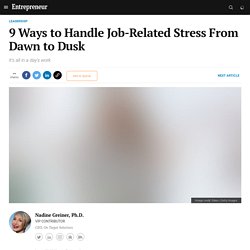
August 20, 2019 7 min read Opinions expressed by Entrepreneur contributors are their own. All evidence points to the fact that workplace stress is an epidemic, and it's only continuing to worsen. According to data compiled by the Centers for Disease Control and Prevention, between 29 and 40 percent of Americans are disproprotionately stressed at work. The effects of that stress are far-reaching and differ in severity. Unfortunately, it's an almost impossible task to find a low-stress job. 1. As a busy executive or employee, mornings can be a flurry of activity. How you start your day matters. 2. After you've arrived at the office, planning and organization should be your first priorities, even if you're a naturally disorganized person. Read This: Stress-Less Leadership | Amazon | Barnes & Noble | Apple Books | IndieBound 3. Multitasking was once heralded as a prime way to maximize time and get more accomplished. Exercise for better mental health, Sport News.
When you are struggling with your mental health, getting active may be one of the last things you feel like doing.
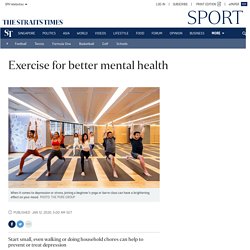
But, if you can muster the energy, evidence shows that exercise has a powerfully beneficial effect. One study last year, published in medical journal Jama Psychiatry, found that physical activity is an effective prevention strategy for depression. Another 2015 paper found that exercise can be as helpful in treating mild to moderate depression as antidepressants and psychotherapy. "We have known for a long time that exercise promotes physiological and neurochemical responses that make you feel good," says Professor Nanette Mutrie of the University of Edinburgh's Institute for Sport, Physical Education and Health Sciences. When we exercise, the brain releases endorphins, as well as dopamine and serotonin. "Very often, these same chemicals form part of antidepressant drugs," she says.
There is also a psychological component to exercise that makes us feel good. Seeking help for burnout is ‘not weak’, Latest Singapore News. In 2012, work stress coupled with inadequate sleep caused a lawyer in private practice to have debilitating migraines every other day.
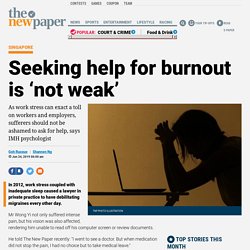
Mr Wong Yi not only suffered intense pain, but his vision was also affected, rendering him unable to read off his computer screen or review documents. He told The New Paper recently: "I went to see a doctor. But when medication did not stop the pain, I had no choice but to take medical leave. " During this period, Mr Wong was working 11-hour days and sleeping only four to five hours. He became increasingly exhausted, demoralised and disillusioned. When he realised that he was experiencing burnout, he took steps to help himself and left private practice to become an in-house lawyer in August 2014.
The World Health Organisation (WHO) classifies burnout as an "occupational phenomenon", not a medical condition. According to WHO, burnout occurs due to chronic workplace stress that has not been successfully managed. She offers these tips: